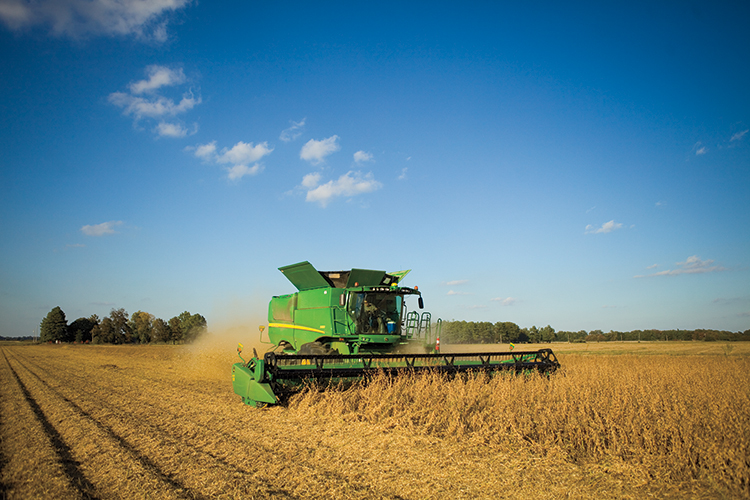Home > Arkansas > Arkansas Crops & Livestock > Arkansas Soy Smarts
Arkansas Soy Smarts

As you go about your daily routine, keep this in mind: everything from cooking oils and car seats to plastics and ink contains soybeans. As the No. 2 commodity in the state, soybeans – and the farmers that grow them – make a major impact on consumers’ everyday lives and contribute $2 billion annually to Arkansas’s economy.
“The list could go on forever,” says West Higginbothom, chairman of the Arkansas Soybean Promotion Board, touching on the uses of soybeans. “There are a lot of products and indirect jobs related to soybeans that reach a lot farther than people realize. If you’re a woman who wears makeup, there’s a very good chance there’s soybean oil in that makeup.”
Higginbothom says soybeans are his largest crop, though he also grows corn, sorghum and winter wheat on his diversified farm in the state’s Delta region.
“Just about every row crop farmer now grows soybeans, where it used to be a rotational or cover crop,” he says. “Now, it’s viewed as a high-value crop.”
Feeding the World
Soybeans have a great number of benefits that increase their value, and are extremely important to the state’s overall agriculture industry. Vital to the economy, soybeans go hand in hand with Arkansas’s top commodity, broilers, and the animal agriculture industry as a whole.
“Ninety-eight percent of soybean meal is used in animal feed,” says Dr. Lanny Ashlock, research coordinator for the Arkansas Soybean Promotion Board. “Arkansas is second in the nation in broiler production and third for catfish production. That means soybeans are vital for supporting our No. 1 consumer, the animal ag industry.”
Higginbothom agrees, adding that most of the soybean exports that leave Arkansas are used for animal feed overseas.
“China is a big player in exports, and even if the soybeans themselves don’t get exported, they usually do anyway in the form of animal feed, so it’s a win-win.” he says. “I feel like a lot of farmers failed to see the bigger picture before, but now it’s apparent how important the livestock industry is to soybean farmers.”

An Easy Crop
Arkansas soybeans are concentrated in the eastern part of the state, but are grown in 50 of the state’s 75 counties. Higginbothom says they’re a very functional and easy-to-grow crop, making them even more valuable for row crop farmers.
“Soybeans are great for putting nutrients into the soil, because it’s a legume crop. They don’t need nitrogen like other row crops, so you can use less fertilizer,” he says. “They grow in a wide range of soil types and climates, and you can use the same equipment, including the planters and harvesters, for soybeans as you do for corn or grain.”
Ashlock adds that because soybeans are so efficient in extracting nutrients from soil, it helps farmers to be good stewards of the land and ensure environmental sustainability, since the crop requires less fertilizer.
Arkansas also has a long growing season, giving farmers the flexibility to plant from April into July, according to Ashlock. This gives them the option of planting soybeans behind a small grain like wheat or oats, allowing for two crops within the same calendar year. This is known as double-cropping.
Good for the Economy and Consumers
Over the years, soybean production has grown to be one of the largest agricultural enterprises in Arkansas. In fact, in 2012, the state’s soybean farmers outperformed the national average, with a yield of 43 bushels per acre. The national average was 39.3 bushels per acre.
While that success has pushed Arkansas to No. 10 for soybean production in the country, created thousands of jobs and helped farmers diversify, consumers also benefit from the crop’s many nutritional qualities.
Soybeans contain essential nutrients that boost growth and development, and help with reduced risk of heart disease, weight management, prevention of cancers and more. You can find soy ingredients, whether meal or oil, in everything from baking flour to protein shakes, because soy is a high-quality source of protein with little saturated fat. Second to animal agriculture, the food industry is a major customer for soybean farmers, using 87 percent of oil in food products such as cooking oils, salad dressings and more.
Arkansas’s soybean industry is poised for growth, but needs the continued support of consumers.
“We hope consumers continue to support soybean farmers every single day,” says Ashlock. “They can do that in a very blatant manner, by purchasing makeup with soy, soy candles, household cleaners made with soy and foods that consume soy, like chicken, fish and pork grown here in Arkansas.”



